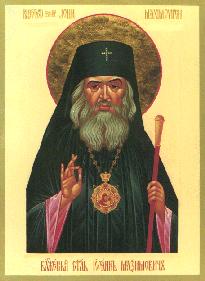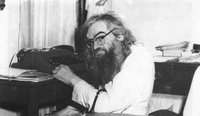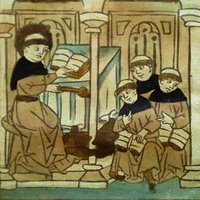Christian Service in War

Christian Service in War
by Metropolitan Philaret (Voznesensky) of New York
Translated by Hieromonk Varlaam Novakshonoff
Avoid war, but when it must be fought it can be the sacrifice of laying down one's life for the friend.
Naturally, this Christian patriotism we have spoken of requires from each of us as great a service as possible to the nation. The value of such service is even more significant if it is rendered unselfishly - free of any material calculations and considerations. A person serves the country in one way or another when he participates in its life by, for example, expressing himself in the press or in civil elections, etc. In this, one must strive to bring benefit to the whole country, the whole people, and not to one's own personal or party interests - then one's conscience will be at peace. It may be that one will not attain great external success, but let him, nevertheless fulfil the duty of a patriot and a faithful child of the nation in an honorable and Christian manner.
There is a saying, "In misfortune, a friend is known." Love for the nation is most clearly manifested in times of national trials and troubles. We all know how it feels when someone close to us is ill. We do not want diversions or satisfactions. In our sorrow and concern, we sometimes cannot even eat or drink or sleep. One who truly loves one's nation will manifest similar feelings during times of national troubles. If our heart is filled with nothing but our own personal experiences and interests, if we moan and sigh while our deeds remain far from our words, then our love for the nation is poor indeed.
One of the clearest and most self-denying struggles of service to one's homeland is to die for the nation. A Christian soldier is a defender of the homeland, and clearly fulfils Christ's precept, "there is no greater love than to lay down one's life for one's brethren."
War in itself is absolutely evil, an extremely sad phenomenon and deeply contrary to the very essence of Christianity. Words cannot express how joyous it would be if people ceased to war with one another and peace reigned on earth. Sad reality speaks quite otherwise, however. Only some dreamers far removed from reality and some narrowly one-sided sectarians can pretend that war can be omitted from real life.
It is quite correct to point out that war is a violation of the commandment, "Do not kill." No one will argue against that. Still, we see from the Holy Scripture that in that very same Old Testament time when this commandment was given, the Israelite people fought on command from God, and defeated their enemies with God's help. Consequently, the meaning of the commandment, "Do not kill," does not refer unconditionally to every act of removing a person's life. This commandment forbids killing for revenge, in anger, by personal decision or act of will. When our Savior explained the deep meaning of this commandment, He pointed out that it forbids not only actual killing, but also an un-Christian, vain anger.
Nevertheless, in a conversation with the apostles about the last days, the Lord told them, "You will hear of wars and reports of wars. See that you are not distressed: for all this must be." With these words, the Lord refutes all statements that war is avoidable.
True, we have already examined the fact that war is a negative phenomenon. Yet, it will exist, sometimes as the sole defense of truth and human rights, or against seizure, brutal invasion and violence. Only such wars of defense are recognized in Christian teaching. In fact, we hear of the following event in the life of St. Athanasios of the Holy Mountain.
Prince Tornikian of Georgia, an eminent commander of the Byzantine armies, was received into monasticism at St Athanasios' monastery. During the time of the Persian invasion, Empress Zoe recalled Tornikian to command the armies. Tornikian flatly refused on the grounds that he was a monk. But St. Athanasios said to him, "We are all children of our homeland and we are obligated to defend it. Our obligation is to guard the homeland from enemies by prayers. Nevertheless, if God deems it expedient to use both our hands and our heart for the common weal, we must submit completely ... If you do not obey the ruler, you will have to answer for the blood of your compatriots whom you did not wish to save." Tornikian submitted, defeated the enemy and rescued the homeland from danger.
In a conversation with Mohammedans, about war, St. Cyril the Enlightener of the Slavs said, "We meekly endure personal offenses; but as a society, we defend each other, laying down our lives for our neighbors..."
One can, of course, sin and sin greatly while participating in war. This happens when one participates in war with a feeling of personal hatred, vengeance, or vainglory and with proud personal aims. On the contrary, the less the soldier thinks about himself, and the more he is ready to lay down his life for others, the closer he approaches to the martyr's crown.
Reprinted from the booklet published by the Committee on Education of "The North American Traditional Orthodox Mission" and "The Department of Education of The Canadian Orthodox Church"
Missionary Leaflet # E37b
Copyright © 2001 Holy Trinity Orthodox Mission
466 Foothill Blvd, Box 397, La Canada, Ca








2 Comments:
Hi Eric!
It's already a week past forgiveness Sunday, but I will ask any way: Please forgive me all the sins I have committed against you. I hope your first week of Great Lent has gone well. Thanks for posting this article. I have recently thinking about this topic and was hoping to find something on this topic. It was very helpful and interesting. Very balanced. We should hope, pray, and practice, peace, but not be utopian thinking this world can be perfect. I hope you are well. God bless you, and me too!
Thank you for posting these important words from this man of God. Today is the 4 anniversary of the death of some Christian soldiers I was privileged to know and pray for at the hour of their deaths. Today again my priest prayed for them in their journey home. May light perpetual shine upon Peter, Raymond, and Toby. Task Force 1-7, Bayji Iraq. "Never broken by hardship or battle."
Post a Comment
<< Home